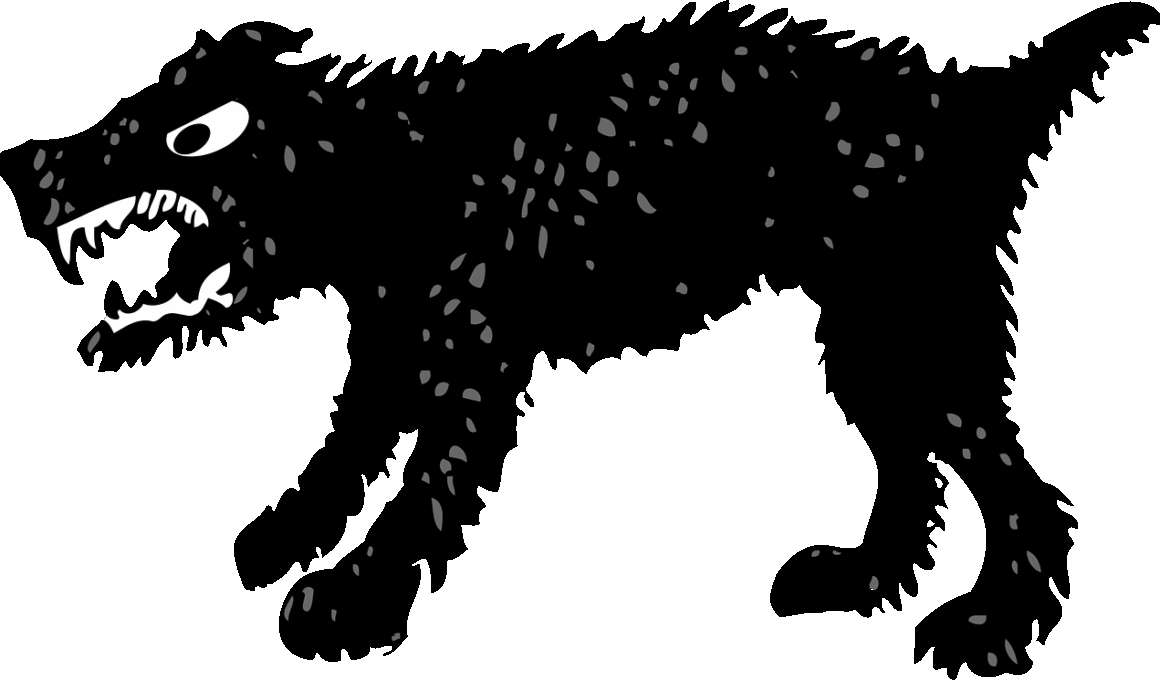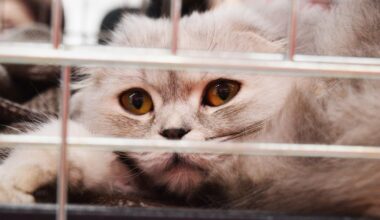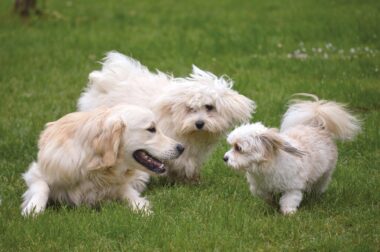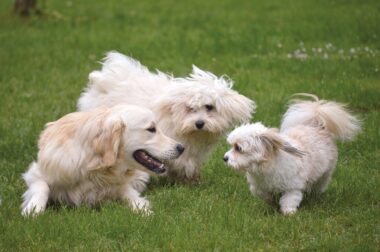The Connection Between Socialization and Aggression in Dogs
Understanding the link between socialization and aggression in dogs is critical for pet owners and trainers alike. Aggressive behavior can be alarming and concerning, not only for the owner but also for other pets and people. Socializing your dog, especially during its puppy years, can significantly impact their temperament as adults. Creating positive interactions with various environments, people, and other animals helps build confidence. Insecure or fearful dogs are more likely to display aggressive tendencies. When dogs are adequately socialized, they can learn appropriate responses to the world around them. Early socialization prevents the formation of fearful behaviors which can lead to aggression later on. Dog owners should engage their pets in diverse social experiences, making sure to prioritize positive experiences over negative ones. Encouraging your dog to meet other well-mannered dogs and exposing them to a variety of environments can pave the way for a well-adjusted adult dog. Professional trainers or doggy daycare facilities may assist in providing safe socialization opportunities and guidance for overcoming any existing behavioral issues.
Failure to socialize your dog can yield negative behavioral outcomes, making it essential to focus on this aspect of training early on. Unfamiliar situations or dogs can trigger fear or fright, leading to aggression as a defense mechanism. The fear-aggression relationship highlights how a lack of positive interactions can increase a dog’s anxiety levels. For instance, when a dog encounters a strange dog without proper guidance and socialization, it may react aggressively rather than with curiosity. Various studies suggest that dogs with poor socialization are significantly more likely to display aggression compared to their well-socialized counterparts. Creating a structured environment for socialization not only reduces aggression but also encourages positive behavioral patterns. This often involves employing techniques such as gradual exposure to new experiences and controlled introductions to other dogs. Mental stimulation through positive reinforcement, which rewards good behaviors, is vital during socialization efforts. As a dog owner, ensuring that your dog remains calm and composed in various situations helps in reducing the chances of aggressive responses in unfamiliar circumstances. Consistency, patience, and proper training tools are crucial components in fostering healthy socialization.
Signs of Aggression Related to Poor Socialization
Recognizing the signs of aggression stemming from inadequate socialization can profoundly affect a dog’s development. Common signs of aggression include growling, barking excessively, lunging, and displaying a stiff posture. Dogs that have not been properly socialized may react negatively to new stimuli, perceiving them as threats. In addition to overt aggression, fearfulness can also manifest in shy behaviors like tail tucking, reluctance to approach new people or environments, and hiding. It’s important to understand these signs to address the underlying issues effectively. Aggression often escalates if left unaddressed, reinforcing undesirable behaviors over time, which can create ongoing problems. Furthermore, aggression based on fear or insecurity may potentially lead to physical confrontations with other dogs or humans. Thus, recognizing these early warning signs allows dog owners to intervene promptly and seek professional help when necessary. Training methods that utilize desensitizing exercises and positive reinforcement techniques can alter these undesirable behaviors. Fostering an environment where your dog feels safe and secure is essential to mitigating risks of aggression due to socialization deficiencies.
Proper socialization can dramatically reduce instances of aggressive behavior in dogs, facilitating smoother interactions within their surroundings. Socialization should commence early, ideally between the ages of three to fourteen weeks when puppies are most receptive to new experiences. Introducing puppies to varied people, environments, sounds, and other dogs helps shape their perceptions positively. Additionally, reinforcing favorable interactions during this developmental stage can go a long way in building a solid behavioral foundation. Gradual introduction techniques during social sessions allow puppies to encounter new situations without distress. As they become familiarized with various stimuli, they’re less likely to react fearfully or aggressively. Consistent social exposure equips dogs with valuable coping mechanisms. It helps them navigate the complexities of their environment confidently. Engaging in group classes or joining playgroups can bolster your dog’s adaptability and resilience. Furthermore, regular social activities stimulate mental agility and emotional growth. As owners and trainers, leveraging every opportunity for positive engagement can enhance the overall experiences for dogs. Cultivating confidence through these methods creates a well-integrated canine capable of navigating both energetic and calm settings successfully.
The Role of Positive Reinforcement in Socialization
Positive reinforcement plays a pivotal role in establishing a strong link between socialization and aggression management in dogs. This training technique encourages desirable behaviors through rewards. By rewarding dogs with treats, praise, or playtime, owners can foster a strong association with social experiences. This approach not only helps dogs associate unfamiliar situations with pleasant outcomes but also reduces anxiety in new settings. Successful socialization experiences reinforced positively can prevent fear-induced aggression down the line. Positive reinforcement techniques can vary from offering verbal praise for calm behavior to providing treats for good interactions with other dogs. Ensuring that every interaction is paired with a reward can solidify the desired response. Moreover, consistency in using these methods strengthens the learning process. Owners should adapt their reinforcement strategies based on their dog’s personality and specific triggers. Gradually increasing the complexity of social interactions—like introducing more challenging environments—while continuously rewarding positive responses lays the groundwork for enhanced behavior. Investing time in fostering positive social experiences will ultimately provide dogs with the tools needed to navigate social scenarios while minimizing aggression risks.
Engaging with a professional trainer can enhance the socialization journey for both dog and owner. Trainers often have extensive knowledge and experience, equipping them to address various behavioral issues through structured programs. These trainers can provide tailored guidance based on the individual dog’s temperament and needs. They can identify specific areas where a dog may need improvement or social exposure and develop training plans aimed at addressing these concerns. Moreover, attending obedience classes or socialization workshops can provide valuable insights and techniques that owners can implement at home. Exposing dogs to their peers in controlled environments under professional supervision is beneficial. Professional guidance ensures that owners are equipped with effective strategies to manage aggressive tendencies appropriately. Additionally, they can offer advice on how to correctly intervene if an aggressive incident occurs. Building a positive rapport with trainers can also foster a greater understanding between dog and owner, easing potential behavioral issues. Understanding the critical aspects of socialization while collaborating with experienced professionals can create a safer community for both your dog and others.
Conclusion: Prioritizing Socialization for a Balanced Dog
Ultimately, prioritizing socialization is fundamental for fostering a balanced and well-adjusted dog. Recognizing that socialization directly correlates with reducing aggression is essential for ensuring dog welfare. Early and continuous social exposure can be the difference between a confident, friendly dog and one prone to aggression due to fear. Owners must actively engage in providing varied experiences for their dogs, rewarding positive behavior, and addressing any signs of aggression immediately. Successful social experiences will build a resilient canine capable of adjusting to different situations. Regular assessment of your dog’s behavior in social settings can provide insights into their emotional state. This allows owners to adapt their training techniques as needed. It is equally important to be patient throughout this process, as nurturing social skills takes time. Encouraging respectful and friendly interactions will ultimately yield a well-socialized and less aggressive dog. Embracing the message of prevention through socialization will create a more harmonious environment for dogs, pet owners, and the broader community. The responsibility rests with pet owners to ensure their dogs thrive socially, leading to happier and healthier lives.
The importance placed on positive socialization experiences cannot be overstated, as they prevent aggression and facilitate harmonious cohabitation among dogs. Engaging in routine interactions, rewarding desirable behaviors, and encouraging exploration are crucial components that foster a strong bond between dogs and their owners. Through consistent training, dogs not only learn appropriate behaviors but also gain confidence in their social skills. As dogs venture into the world, positive socialization experiences enrich their lives, calms their tempers, and reinforces their stable dispositions. In conclusion, recognizing the deep connection between effective socialization and aggression in dogs should be a priority for all dog owners. Fostering supportive environments while being proactive in addressing aggressive tendencies ensures that dogs can lead fulfilling lives as friendly companions within diverse communities.





